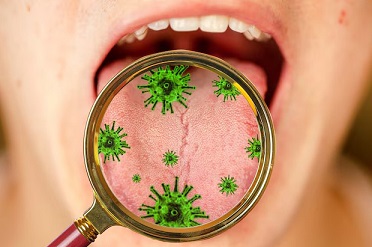SARS-CoV-2 Also Targets The Submandibular Glands, Causing Hyposalivation And Xerostomia
Nikhil Prasad Fact checked by:Thailand Medical News Team Jun 23, 2024 10 months, 3 days, 16 hours, 13 minutes ago
COVID-19 News: The Unexpected Impact of COVID-19 on Oral Health
COVID-19 has introduced many unexpected symptoms, one of which is xerostomia, or dry mouth. This condition, reported by numerous COVID-19 patients, has puzzled researchers for months. A recent study by researchers from the Dental School–São Paulo State University (UNESP)-Brazil and the Federal University of São Paulo-Brazil that is covered in this
COVID-19 News report, sheds light on this phenomenon, revealing how SARS-CoV-2 targets the submandibular glands, leading to reduced saliva production and the uncomfortable sensation of dry mouth.
 SARS-CoV-2 Also Targets The Submandibular Glands,
SARS-CoV-2 Also Targets The Submandibular Glands,
Causing Hyposalivation And Xerostomia
The Role of Submandibular Glands in Saliva Production
The submandibular glands, located beneath the lower jaw, are crucial for producing saliva. Saliva is essential for various functions, including digestion, oral hygiene, and maintaining moisture in the mouth. When these glands are compromised, it can result in a significant reduction in saliva production, leading to dry mouth, difficulty in swallowing, and an increased risk of oral infections.
COVID-19's Invasion of Salivary Glands
Researchers have discovered that SARS-CoV-2 can directly infect the submandibular glands. Using mice as a model, the study found the presence of the virus's spike and nucleocapsid proteins in the cells of these glands. This direct infection initiates a cascade of harmful effects that disrupt the normal functioning of the glands.
Immune Response and Inflammation
Upon infection, the submandibular glands trigger an immune response. The gland cells start producing pro-inflammatory cytokines such as IL-1β and TNF-α. These cytokines are meant to defend the body against the virus but also cause inflammation and damage to the gland tissues. This inflammation is a double-edged sword, contributing to both the defense against the virus and the damage to the glands' ability to produce saliva.
The Paradox of Mucin Production
While SARS-CoV-2 causes increased mucus production in the respiratory tract, it paradoxically leads to decreased saliva production in the submandibular glands. The infected gland cells, particularly the acinar cells responsible for secreting mucin, become enlarged (a condition known as hypertrophy) and produce excessive mucin. This overproduction of mucin compresses the ducts that transport saliva to the mouth, further exacerbating the sensation of dry mouth.
Structural Damage to Myoepithelial Cells and Telocytes
The study also highlights significant structural damage to the myoepithelial cells and telocytes in the infected glands. Myoepithelial cells are crucial for contracting and pushing saliva through the ducts, while telocytes help maintain the structural integrity of the glands. Damage to these cells leads to impaire
d saliva secretion, contributing to the overall reduction in saliva and the development of xerostomia.
The EGF-EGFR Signaling Pathway's Role
An important finding of the study is the involvement of the Epidermal Growth Factor (EGF) and its receptor (EGFR) signaling pathway. Normally, this pathway plays a role in cell growth and repair. However, in the infected glands, this pathway is overactivated. The increased activity of EGF and EGFR leads to excessive mucin production and acinar cell hypertrophy. This overactivation is driven by the pro-inflammatory cytokines, creating a vicious cycle of inflammation and gland dysfunction.
Clinical Implications for COVID-19 Patients
The insights from this study are crucial for understanding why many COVID-19 patients suffer from dry mouth. The direct infection of the submandibular glands by SARS-CoV-2, coupled with the resulting inflammation and structural damage, leads to significant reductions in saliva production. This understanding can help in developing targeted treatments to alleviate dry mouth symptoms in COVID-19 patients, improving their comfort and quality of life.
Further Research and Future Directions
Future research should focus on finding ways to protect the salivary glands from SARS-CoV-2 infection or to mitigate the damage once infection occurs. Potential treatments could include anti-inflammatory drugs to reduce gland inflammation or therapies aimed at enhancing saliva production. Understanding the molecular pathways involved in gland infection and damage could also lead to novel therapeutic targets.
By expanding our knowledge and developing effective treatments, we can better support COVID-19 patients experiencing xerostomia and improve their recovery and quality of life. This study represents a significant step towards this goal, highlighting the intricate ways in which SARS-CoV-2 affects the body beyond the respiratory system.
Conclusion: Moving Towards Better Management of Xerostomia
Dry mouth is more than just an inconvenience; it can have serious implications for oral and overall health. By uncovering the mechanisms by which SARS-CoV-2 targets and damages the submandibular glands, researchers are paving the way for better management and treatment of xerostomia in COVID-19 patients. As we continue to learn more about this virus, addressing these secondary symptoms will be vital in providing comprehensive care to those affected by COVID-19.
The study findings were published in the peer reviewed International Journal of Molecular Sciences.
https://www.mdpi.com/1422-0067/25/13/6820
For the latest
COVID-19 News, keep on logging to Thailand Medical News.
Read Also:
https://www.thailandmedical.news/news/study-published-in-journal-of-dental-research-adds-xerostomia-or-dry-mouth-as-new-covid-19-symptom-especially-infection-by-delta-variants
https://www.thailandmedical.news/news/more-studies-are-showing-that-covid-19-can-cause-various-oral-health-issues-and-even-damage-your-gums-and-teeth
https://www.thailandmedical.news/news/covid-19-news-japanese-study-warns-of-persistent-gustatory-and-saliva-secretory-dysfunctions-after-recovery-from-covid-19
https://www.thailandmedical.news/news/various-entry-receptors-for-coronaviruses-including-sars-cov-2-discovered-in-the-oral-cavity-which-exhibits-high-susceptibility-for-infections
